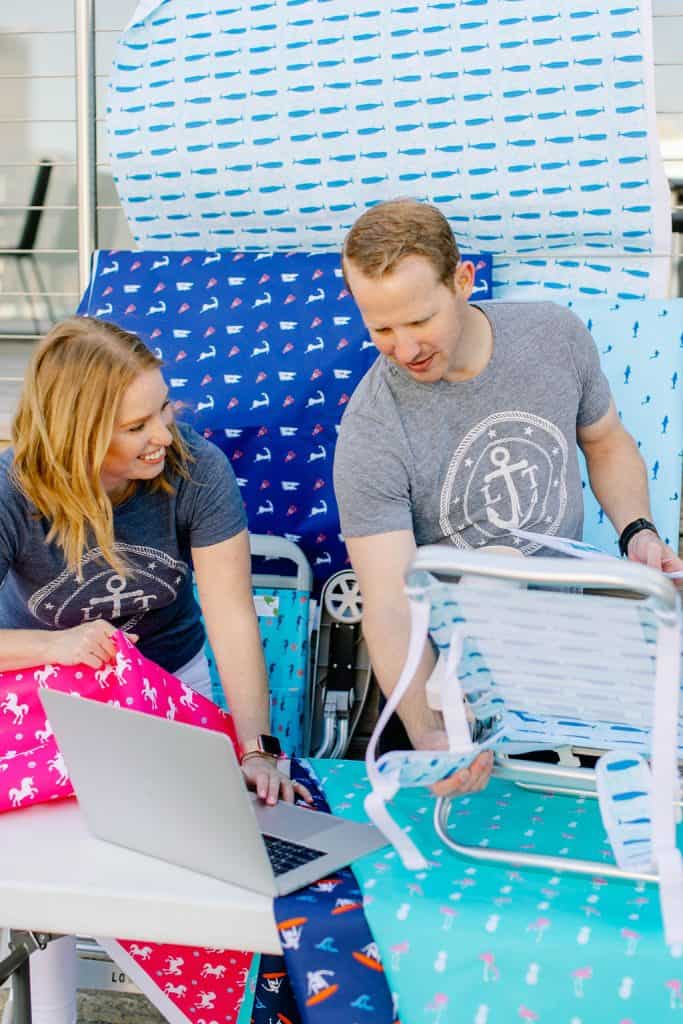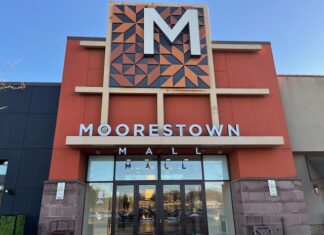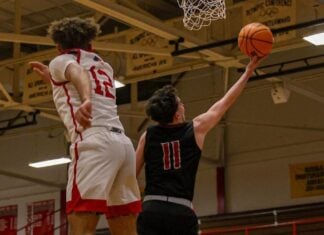

Born and raised in Haddonfield, brother and sister Brenton Hutchinson and Elizabeth Ackmann grew up in a family that claims the honor of building one of the first houses on their street in the southern section of Sea Isle City almost 70 years ago.
In the generations since, the clan has witnessed the pressing, yearly need to replenish beaches due to coastal erosion as well as the increase in development that brought an influx of summer renters, that, in turn, led to an increase in the amount of trash left behind.
That’s why, almost three years ago, the idea for LowTides Ocean Products was born — thinking about the local impact of rubbish on the family’s beloved Jersey beach towns — and learning how ocean currents can carry that waste beyond native shores.
Turning reflection into action, the company aims to leave its mark, sometimes quite literally, on folks who do something as simple as sit on the beach to relax.
“I see the development of all these towns, and it’s fantastic for the local economy,” Hutchinson said during a conversation with the Sun on May 18. “However, all of that brings additional residents and visitors. A lot of times if you’re up early enough, you visit the beach and see the sweeping going on. And collection of trash.
“(The daily effort) never gets all the trash” he added, “so you’re constantly making trips to the trash can, picking up water bottles or cans left behind. It just seems to get worse.”
Hutchinson points to the day he picked up the May 2018 issue of National Geographic at his parents’ Shore home, with its front-page art of an iceberg made completely of plastic, as the moment of inspiration.
“I ended up at the beach that afternoon looking at the ocean, going through a brainstorming session,” he explained. “What’s the solution? How can we take the ocean plastic and do something with it? How do we use that waste and turn it into an upcycled product people could buy?”
Hutchinson looked up and down the shoreline and saw how many beach chairs there were, how many are made of cheaper plastic and which look boring. He started diving into the worlds of podcasting and E-commerce to learn how to start his own business, continuing the family tradition that began with his grandfather’s founding of Cherry Hill based Hutchinson Plumbing.
“That evening, I was pitching to my family this new idea,” he recalled. “I never manufactured before, but I reached out that week to a company that brings your ideas to life, a bunch of engineers. And I started the process that following week. It’s been quite the education.”
Ackmann, a recent transplant to Cherry Hill, acts as the company’s marketing director. But she had to boost her own knowledge of ecological issues in order to help her brother bring his mission to fruition.
“The trash we’re collecting is from the beaches of Haiti, Yucatan and Indonesia, all of which are coming from the Pacific (Ocean) current and the Atlantic current, which goes down the entire East Coast,” she explained. “It’s a global job to keep our waters clean.”
Ackmann added there’s a connection that’s formed when beachgoers dip their toes into the water, knowing they’re literally touching all parts of the world because that liquid has cycled through so much land and water. She hopes an additional connection is made in realizing how that water was affected by trash and plastics before rolling onto the sand.
In Hutchinson’s world travels, he tries to seek out reputable organizations that worked in communities using sustainable ways to collect that ocean plastic.
“It’s a lot of education on the consumer end, and also on Brent’s end,” Ackmann said. “He’s visited all these facilities, in China, in Mexico, and he’s taken that extra step for sustainability and traceability through our process.”
Each chair that’s complete, Hutchinson noted, bears a patch on the top right corner to tell the buyer the story of where it came from. The goal is to inform people of the impact other countries have on our own shores, whether they realize it or not. Purchasing a chair, he opined, helps the greater good.
“It’s been fascinating to watch him go through it. Brent has been hands-on in all aspects, whether it’s design, partner relationships, retail. We get along great,” Elizabeth noted.
“He has four children. I would say LowTides is his fifth.”
Now in its second season, LowTides has prevented over 16,000 pounds of plastic from entering the ocean, and continues to expand its imprint in an effort to drive change for cleaner tides.
For more information, visit: www.lowtidesop.com.
.









